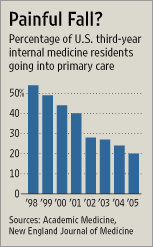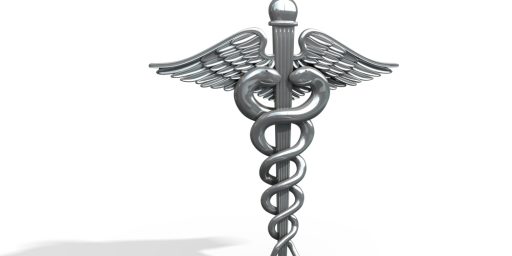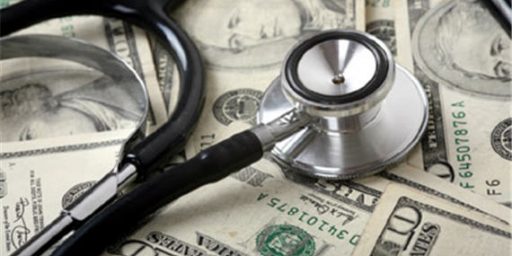It All Gets Back to Incentives
Matthew Yglesias notes an approach to the health care issue he had not considered before,
A little while back, Brad Plumer put on the table a proposal to reduce health care costs I hadn’t heard of — build more medical schools. Apparently there are only 125. Since I’m a
dorksuper-cool guy, I spent Wednesday night getting some beers with a friend and talking about health care policy, and put forward the idea that we should try and import some huge quantity of Indian doctors (I have this picture of India consisting of 100 million doctors, 200 million engineers, and 800 million dirt-poor subsistence farmers; probably that’s not quite right…) which is along the same lines.
However, Matthew then discards this solution due to the following reasons,
There is, however, something of a catch. I recall having read several times articles about the odd fact that when you do regression analysis on Medicare costs by region it turns out that supply of health care is positively correlated with per capita Medicare spending. What seems to be happening is that in areas where there’s a higher ratio of doctors (or hospital beds) to patients, they take advantage of Medicare’s entitlement structure to simply gin up additional business by prescribing enough treatment to use up the local health care capacity.
So, the problem is two fold.
- Not enough doctors.
- Institutional structure that provides perverse incentives.
So the solution is obvious:
- Reform the institutional structure to remove the perverse incentives.
- Increase the supply of doctors.
Of course, the second part is also due to an insitutional problem. Namely the fact that the AMA acts as a gate keeper and provides a very nice barrier to entry. Basic economics tells us that this increases the market power of doctors and that their prices will increase. Further, reforming the institutional structure so that there is no longer a perverse incentive probably isn’t going to sit well with somebody like Matthew. After all, the problem he is noting is an old one, and most of us boring dorky economics guys call it moral hazard. In this case, the government has set up a system that is easily abused for the profit of some (doctors, hospitals and the staff) and losses for others (tax payers). This kind of problem is a problem for a great many government policies such as reducing income inequality. The problem is basically a principal-agent problem. So we see this problem applies to health care, auto insurance, even something like income redistribution. More simply, the problem is that when the government is seen as picking up the tab (i.e., individuals do not bear the full marginal cost) there is a tendency to over use a resource. To prevent this you’d have to have deductibles, and possibly a deductible that is paid for each new procedure, treatment, etc.
Of course, doing things like having deductibles makes the government plan look like a market plan, and since market provided health care is a bad thing, a priori, this can’t be the right solution either (if you are like Matthew). After all, one of the goals of nationalizing health care is to make it so people can gain access to health care irrespective of the cost, right? If people have to pay $250 every time they want a different test you could have people opting not to go to the doctor which in the end is just like people not having insurance. The thing many proponents of nationalizing health care don’t seem to realize (or at least don’t appreciate the full ramifications of) is that health care resources are just like all other private goods: they are limited. Increase the demand (e.g. Medicare) for those resources and the price will increase. The solution for the proponents of nationalizing health care is to then ration health care. Make people wait in line, make certain procedures impossible, and so forth to keep the monetary costs down. For some reason, to the proponents of nationalizing health care, waiting in line is not a cost, having to wait for treatment is not a cost (i.e., spending weeks on crutches waiting for treatement), and not having certain procedures is not a cost. I find the last one rather amusing. The complaint of the proponents of nationalized health care is that not everybody has quick and easy access to health care, but with nationalized health care people might not have any access at all to certain procedures.
The basic problem for the proponents of nationalizing health care is that people are going to try and wring as much benefit out of what ever system is put in place. Thus, the proponents of nationalizing health care need to address the incentive problem in a serious manner. Failing to do that means that they are simply engaged in fantasy.






Great post , you have elaborately explained why not to trust donctors where the rest of us just use our guts. You think the public health care system is bad, I dare you to step you toes into the sea of private psychiatry.
Somewhat off topic:
Steve,
Which country that has the necessary political situation (no NH), educational system, and culture will become the next provider of top-notch pay-for-service health care? I want to buy super early cheap air fares.
Seriously, if we go national health, everybody who now comes here (and us!) will have to go somewhere else and nature abhors a vacuum. So who will step up and enhance their economy by providing a desired service?
Another way to increase the supply of doctors is to beef up Nurse Practitioner training, and give nurses wider prescribing authority. Another advantage: Nurses and Nurse-practioners are paying off much smaller student loans than doctors are.
How about this: anyone who uses more than X amount of healthcare a year automatically gets audited by the IRS. That would keep frivolous use down, at least among those who pay taxes.
Eric, that strikes me as a bad idea. Catastrophic care (auto accidents, cancer treatments) can create a huge bill in a big hurry. Even if most of the cases were open and shut, you’d have hundred of IRS people running down these claims.
I don’t understand what “nationalizing health care” has to do with it. We’re talking about Medicare, which is already nationalized. What’s your proposal? What are we talking about here?
Steve you really are one strange dude.
When was the last time you ‘overused’ a free public good?
Take public roads as an example. They were built essentially for commercial purposes yet they are often used for pleasure. This might be considered overuse by some. If you were charged a toll every mile or so perhaps your ‘overuse’ may be limited.
What about free public libraries? Can you overuse them, learn too much? Some may think the reading for pleasure crowd is overusing this free public good? What do you think? Do you ever read for pleasure? Should you be charged for this use?
And then we come to health care. If free do you really think it will be overused in the same manner as freeways and libraries can be overused?
Who is going to have chemotherapy, kidney dialysis, or open heart surgery for pleasure? Who is going to go into the clinic each Sunday for a family x-ray day, like a day spent at the beach?
Your fear that people will overuse free medical care is really wierd. It may be the conservative crowd you run around with that thinks this way but I can assure you that most Americans don’t. We are not going to put our legs or arms in a plaster cast just because it is free to do so and it might be a fun way to spend an afternoon.
Meezer,
India? Just a guess.
Matthew,
I know you don’t get it. It was obvious from your first post. A big part of the health care problem is an incentive problem.
Ken,
My God…where to start.
Take public roads as an example.
Public roads are over-used in my neck of the woods every day in the morning and the evening and most weekends. We call it traffic.
Yes, but instead the charge for the roads is via gasoline which does little for the congestions problem.
These probably are more accurately classified as club goods. Exclusion is possible and hence charges could also be put into place. As for over-use, there is a problem that when a given book is checked out nobody else can check it out. Not exactly a model of a pure public good.
By the way, you realize that calling a private good a public good does not make the private good a public good. I could just as easily call you Fido, that wouldn’t make you a dog.
First it wont be free. Second, yes it will be overused if there is no rationing imposed.
You sure have a simplistic view of this problem don’t you (don’t bother responding to that it was rhetorical). The over usage will not occur in those areas, but in areas such as routine doctor’s visits. Going to the doctor for any and all minor ailements. If this demand is meet it will suck in resources from heart surgery, dialysis, and chemotherapy. When the demand in one market increases, the price increases and more resources flow into that market. At least so long as there is no rationing.
In the case with the government providing the health care if it provides for the increased demand for minor things it will mean less resources for things like heart surgery, dialysis, and chemotherapy. To secure more and more resources it will have to pay more. Thus, the only way to limit the increase in costs would be to ration health care resources. To determine who gets what by politically established criteria.
It isn’t my fault you can’t think about this problem in a logical manner.
Yeah, conservatives like Brad DeLong. Did you even follow the link on Moral Hazard? Here is what Brad DeLong writes,
Replace, ‘insurance companies’ with ‘government’. In your partisan bias you have become blinded to things that are not partisan. You are a fool.
Steve, you are still all wrong about the incentives issue.
You think that if medical care is free, just like the public roads, then people will overuse it. But what you fail to understand is that people do not go to a doctor just for the hell of it. The incentives for use are completely different. One, the use of public roads, is somewhat discretionary; the other, medical care, is not.
While both public goods have an element of necessity to them we are not talking about providing free use of discretionary medical services (breast enlargement) just like we provide for free discretionary road use (vacations).
You consistently blame the patient for the high cost of medical care when the real culprit is the provider. You even misuse Brad DeLong to make this point. Re-read what Brad wrote and you will that he is saying it the provider who overtreats the patient. To the extent anyone thinks a patient with totally free access to health care is demanding, and getting, extranous medical treatment without the INCENTIVE to do so laying with the provider is just plain silly. Take the incentive away from the provider and this problem will go away.
But the solution is not to penalize the patient which is what you advocate.
Putting doctors on salary will remove the incentive to overtreat without losing any quality of care.
And I never claimed it. I don’t use freeways for the hell of it either. I bet very few people do. This is a strawman and the basis for your argument…so your argument crumbles. You still might be right, but the evidence behind the problem of Moral Hazard is quite strong.
For somethings you are correct for others you are not correct. For example, my son is sick with possibly the flu. I could take him to the doctor, or give him some advil, monitor his temperature and keep him home and see if he gets better. Discretionary, and the first option eats up more health care resources.
Medical care is not a public good. A public good is one that is non-rivalrous and non-excludable. On both grounds medical care fails. If you get a shot, nobody else can use that medicine. If a doctor is operating on you, he can’t operate on another patient. If you are in an MRI, another person cannot use it. Hence medical care is largely rivalrous and by definition is a private good.
Irrelevant, and funny you are admitting there is a problem with…wait for it…over use. You just agreed that over use will be a problem. Further, Brad says nothing about who is responsible for over treatment you simply made that up.
I have not advocated any such position and it is dishonest of you to suggest that I do.
Right, which is why it worked so well for HMOs. HMOs discourage use of their services by their patients as a matter of routine. They do this to control costs. So even with the salary there is still an incentive problem.
And get it through your head that nothing is free. N.O.T.H.I.N.G. Everything has a cost. Even public roads. Christ.
I agree that proponents of nationalizing health care need to address the incentive problem you describe if it can actually be demonstrated that demand factors are a real source of cost increase in health care. Do you have such a demonstration? I would genuinely like to see it.
To those who say that “no one would go to the doctor if they don’t have to” I say, yes, they sure do. My husband and I are self-employed with no insurance. All of our friends work in the steel mills (fabulous insurance) or are professionals with good insurance.
Taking just the adults, they go to the doctor ten times as much as we do. Every single sniffle has to have its antibiotic prescription (which won’t help since it’s viral in the main). I slightly pull a muscle while house painting and I use RICE and get over it on my own (completely). So-and-so does the exact same thing and has: an office visit, an MRI, and 2 months of twice a week physical therapy. End result 2 months later: we’re both fully recovered. And when you add in the kids: hoo-boy! They go in for every scraped knee or one-time cough.
I’m sorry but this is just an inaccurate portrayal of my post. I am not saying that the current problem is due solely to demand side issues, but that nationalizing health care without giving thought to the incentive problem will not help the problem.
Steve, you really don’t get it do you?
To the extent overuse is a problem it is not a very big one. Most medical procedures are completely justified by medical need. And to the extent it is a problem the fault does not lie with the patient, as you seem to think, but with those fee for service providers who try to pad their billings with unneeded tests etc. This can be solved without punishing the patient.
And if Brad Delong thinks patients are responsible for ordering/providing their own medical treatment he is just as mistaken as you are.
When a third party is picking up the tab a patient has no incentive to stop the doctor from overtreating but the patient is not the one with the incentive to cause the overtreatment in the first place. If fact, since most all medical procedures are essentially uncomfortable and a pain in the ass, the patient already has an negative incentive to overuse the system.
If a doctor were to tell you that your childs cough might be due to a flu or due to tuberculosis and the only way to find out is with a chest x-ray what are you going to do? Say no? And if the cost to you is a twelve hour wait or a $$ fee what difference does it make? You are still going to pay it either way.
Now if the doctor has a financial interest in the number of x-rays taken there may be a chance that the doctor is not acting in good faith with you. But it is not your fault that your son is being overtreated.
I guess I misunderstood. When you wrote:
More simply, the problem is that when the government is seen as picking up the tab (i.e., individuals do not bear the full marginal cost) there is a tendency to over use a resource.
I thought you were saying that demand for health care rose because government was seen as picking up the tab. Now I realize I have no idea of what you are saying.
BTW you really should read my post on Gammon’s Law. As it turns out neither increasing supply nor reducing demand per se is likely to have much effect on health care costs.
No, you are the one who doesn’t get it. It is as simple as this: health care is not a public good. Calling a public good does not make it a public good. Fashioning policy as if it were a public good wont make it a public good. I just isn’t a public good.
I never said it was entirely the patients fault. However, I think you are ignoring a big problem here.
Brad didn’t imply that either and for you to make up stuff and put words in his mouth and mine is annoying to say the least.
Sounds to me like the responsibility lies with both the patient and the doctor.
I’m going to say, what about that little prick that they do on the arm? Of course, I’m a bit of prick myself and tend not to take whatever the doctor says as the word of God.
I might rather pay the $$, which you just don’t seem to be able to understand.
Anyhow, it is nice that you finally agree that overuse is a problem.
Dave,
Explain to me why the two issues are mutually exclusive? The moral hazard problem is fairly well known. Seems to me it would exacerbate the problem, i.e., if the effect you describe is true, then the probelm I’m describing simply makes it worse.